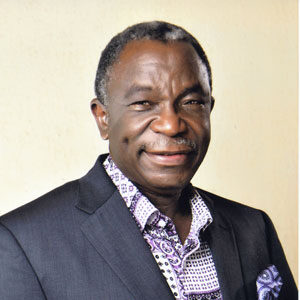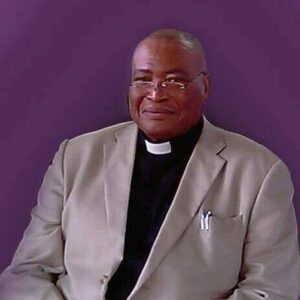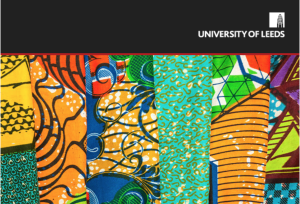2018
Jacob Olupona wins Martin E. Marty Award!

Jacob Olupona, Professor of African Religious Traditions of African and African American Studies at Harvard University, has won the 2018 Martin E. Marty Award for the Public Understanding of Religion.
For those attending this year’s AAR, Prof. Olupona will receive his award at the annual Marty Forum on Sunday from 3:30 – 5:00pm in Convention Center-Four Seasons 1, on the Lower Level (session A18-304 in the program book or app). His interlocutor will be John Campbell, former US Ambassador to Nigeria. As chair of the Committee on the Public Understanding of Religion, Erik Owens will be presiding at the session and presenting the award. Please join us!
In announcing the award, Alice Hunt, Executive Director of the American Academy of Religion, noted that “the award recognizes extraordinary contributions to the public understanding of religion by individuals whose work has a relevance and eloquence that speaks, not just to scholars, but more broadly to the public as well.”
Olupona is the author of five books and editor of six others. His research ranges across African spirituality and ritual practices. In detailing religious pluralism in Africa and African diasporic communities in the Americas, his focus includes the less-studied missionaries from Africa who have come to the United States to establish churches. In addition to his seminal scholarship that enhances understanding of the diversity and complexity of African religions, the Marty Award recognizes Olupona’s work for peace and understanding in Nigerian civic, academic, religious and political spheres.
The award recipient is selected by the American Academy of Religion’s Committee on the Public Understanding of Religion. Founded in 1909, the AAR is the world’s largest association of religion scholars with some 8,000 members in North America and abroad. Its mission is to foster excellence in the academic study of religion and enhance the public understanding of religion.
Professor Olupona served as the founding president of the AASR (1995–2000) and was elected as president for a second term (2000–2005). We are delighted to see him honoured in this way and offer our sincere congratulations!
2018
Join Us! AASR Panels & Events @ AAR/SBL Denver 2018
Friends and Colleagues,
It’s almost that time again! As you make plans for the upcoming AAR conference November 17–20, please do plan on joining us for our sponsored/co-sponsored sessions, annual dinner, and business meeting. We look forward to seeing you there!
AASR Annual Dinner:
Sunday (18th), 6:30PM (restaurant closes by 10:00PM)
The Ethiopian Restaurant
2816 E. Colfax Ave, Denver, CO
Phone: 303-322-5939
NOTE: *CASH ONLY!*
AASR Business Meeting:
Monday (19th), 9:00AM–11:30AM, P19–100, Convention Center-Mile High 3B (Lower Level), following the session on Empire, Religion, Health, and Human Capital in Africa.
AASR Sponsored Sessions (AAR):
- P18-200
African Association for the Study of Religions
Theme: Power and Subversion African Religious Spaces
Elana Jefferson-Tatum, Tufts University, Presiding
Sunday (18th) – 1:00 PM–3:00 PM
Convention Center-Mile High 2C (Lower Level)
African Christianity and the Intersection Between Faith, Traditional And Biomedical Healing
Dying and Rising as the Moon Does”: The Keiskamma Art Project, the Persistence of the Xhosa People, and the Possibility of Impossibility
Individualism, Gender and Spirituality: The Nigerian Experience
Unregistered Participant
Unregistered Participant
African Christianity and the Intersection between Faith, Traditional, and Biomedical Healing
Susie Paulik-Babka, University of San Diego
“Dying and Rising as the Moon Does”: The Keiskamma Art Project, the Persistence of the Xhosa People, and the Possibility of Impossibility
Bolaji Bateye, Obafemi Awolowo University
Unregistered Participant
“The Church as Family, Things Are No Longer What They Used to Be”: Individualism, Genderization, and Scripturalization of Spirituality, the Nigerian Experience
- P19-100
African Association for the Study of Religions
Theme: Empire, Religion, Health, and Human Capital in Africa
Elias Kifon Bongmba, Rice University, Presiding
Monday (19th) – 9:00 AM–11:30 AM
Convention Center-Mile High 3B (Lower Level)
Empire, Religion, Health and Human Capital in Africa
Colonialism, Traditional African Religion, and the Catholic Church in Kenya
Humanizing Rituals in the American Presbyterian Congo Mission
Muhammad, Capitalist Ethics, and Muslim Reform in Burkina Faso
Timothy Carey, Boston College
“Who do the crowds say that I am?”: Colonialism, Traditional African Religion, and the Catholic Church in Kenya
Jesse Miller, Florida State University
Muhammad, Capitalist Ethics, and Muslim Reform in Burkina Faso
Unregistered Participant
Humanizing Rituals in the American Presbyterian Congo Mission
Business Meeting:
Elias Kifon Bongmba, Rice University
Corey Williams, Leiden University
AASR Co-Sponsored Sessions (SBL):
A19-411
Ecclesiological Investigations Unit and African Association for the Study of Religion
Theme: Ecclesial Experiences in African Contexts
Aaron Hollander, Loyola University Chicago, Presiding
Monday (19th) – 5:30 PM–7:00 PM
Hyatt Regency-Capitol 5 (Fourth Level)
The three papers of this session present ecclesial experiences in three distinct African contexts that have made or ought to make substantial contributions to the wider life of the Christian churches and to their understandings of the church. The first paper starts from twentieth-century liturgical reforms in the Ethiopian Tewahedo Orthodox Church, and analyzes the way in which local, national, and diasporic identity changed in relation to the transition between orality and textuality in these reforms. The second paper begins from the historic experience of the Christian descendants of slaves from the Kongo kingdom, and from that history makes a constructive theological argument for the importance of the “slave template” in undermining ecclesiologies of power and strength. The third paper, drawing on the work of Ghanaian Presbyterian Kwame Bediako and of Cameroonian Catholic Jean-Marc Éla, highlights the incorporation of ancestors in African theology and ecclesiology as a gift to be received by the wider communion of churches.
Andrew Salzmann, Benedictine College
Agency and Identity in Ethiopian Liturgical Reform
Elochukwu Eugene Uzukwu, Duquesne University
Liberation and the Slave-Template: Catholic Church, Religions and Cultures, and the Transformation of Society
Ross Kane, Virginia Theological Seminary
Enlarging the Cloud of Witnesses: Ancestors and the Church in Kwame Bediako and Jean-Marc Éla
- S19–200
Joint Session With: African Biblical Hermeneutics; African Association for the Study of Religions
Monday (19th) 1:00 PM–3:30 PM
Room: Range Ballroom – Crowne Plaza (CP)
Theme: Scripturalization and Orality in/as African Spirituality
Althea Spencer Miller, Drew University, Presiding
A. Paige Rawson, Drew University
The Archipelogics of Africana Biblical Hermeneutics: Africana, Orality, and Transtextual Biblical Interpretation in the Twenty-First Century (35 min)
Madipoane Masenya (Ngwan’a Mphahlele), University of South Africa
Navigating the Collusions and Contradictions of African Orality and the Digital Age in Understandings of the Bible (35 min)
Knut Holter, VID Specialized University, Norway
Isak—the Son of the Rainmaker—and the Bible: An Example of Resistance Hermeneutics in Zululand in the 1860s and 70s (35 min)
Sara Fretheim, University of Edinburgh
“Kasakyerew ho nimdefo, mo!” (Those gifted in the knowledge of writing of language, congratulations!): Kwame Bediako, Mother-Tongue Theology, and Orality—African Epistemologies and Spirituality (35 min)
Discussion (10 min)
2018
CfP: Circle of Concerned African Women Theologians July 2019
Call for Papers
Circle of Concerned African Women Theologian 5th Pan-African Conference
The Department of Theology and Religious Studies
University of Botswana
Gaborone, Botswana
July 2-5, 2019
Conference Theme
Mother Earth and Mother Africa in Theological/Religious/Cultural/Philosophical Imagination
As the Circle of Concerned African Women Theologians celebrates thirty years of existence and impressive productivity, the fifth continent wide conference shall be held in Gaborone, Botswana in July 2-5, 2019. Given that the land is often constructed as female gendered and the oppression of women is interlinked with the oppression of the Earth; and given that it is widely acknowledged that we live in the era of global warming – which is humanly induced and of which many have also linked with anthropocentric religious/cultural/theological perspectives — the conference theme calls for research papers that interrogate the link between gender, land, race, class, ethnicity, colonialism, globalization and environmental sustainability. It solicits for papers that reimagine human relationships with the Earth from paradigms of liberation.
Research papers that are using various methods and theories; drawn from diverse religious, cultural, philosophical and theological traditions, are solicited to investigate the intersection of gender, religion and the environment, while analyzing the relationships between women and the land of the past, present and future. Papers that re-read religious/philosophical/cultural texts in the light of Sustainable Development Goals are invited. Researchers may seek to describe, expose, interpret, reinterpret, theorize, reimagine the link between social categories, religion and Earth oppression as well as propose liberating perspectives from traditions and sources of their choice such as African oral cultures, Quran, Bible, African creative works, World Religions, amongst others. Several volumes will be published, following the conference, as it is expected that contributors will receive and integrate constructive feedback from conference participants and through the process of peer reviewing.
Interested researchers are invited to submit abstracts from any one of the following sub-themes:
African Religion/Cultural/Philosophy/Oral Literature and the Earth
• Environmental Imagination in African rituals and taboos
• Oral Literature: Proverbs, folktales, sayings, myths and songs
• African Cosmology and Environmental Sustainability
• African Imagination of Community and Environmental Sustainability
• Botho/Ubuntu, Gender and Environmental Sustainably
• Gender, Religion and Access to Land Ownership
• African Colonial History and the Environment
• Globalization, Global Warming and Gender in Africa
• Sustainable Development Goals, Mother Earth and African Oratures
Biblical Literature and the Earth
• Creation Stories, Gender and Ecological Justice
• Environmental Imagination in the Pentateuch
• Earth constructions in prophetic literature
• Ecological Imagination in Wisdom Literature
• Markan/Lukan/Matthean/Johannine Green Christologies
• Ecological Imagination in Pauline and Deutro -Pauline Literature
• Ecological Imagination in Apocalyptic Literature (Revelation)
• Jesus//Paul, Gender and the Environmental Imagination
• Earth-friendly African Biblical Hermeneutics
• Sustainable Development Goals, Mother Earth and Biblical Texts
Earth and Theological Imaginations
• Salvation Reimagined
• Mission Reimagined
• Incarnation and ecological Justice
• Earth-centered Worship
• Creation-centered Eschatology
• Earth-centered Trinitarian models
• Earth Construction in Christian Hymns
• Creation-centered Theology
• Sustainable Development Goals, Mother Earth & Theological Imagination
World Religions and Environmental Imagination
• Islam, Gender and Construction of the Earth
• Christianity, Gender and Ecology
• Hinduism, Gender and Ecology
• Confucianism, Gender and Ecology
• Colonialism, Globalization, Gender and Earth Care
• Sustainable Development Goals, Mother Earth & World Religions
African Novels and Creative Non-Fiction Writers
• Environmental Imagination among African Women Writers
• Environment Imagination African Male Writers
• Colonialism, Land and Gender in African Creative Writers
• Globalization, Land and Gender in African Creative Writers
• Global Warming, Land and Gender in Creative Non-Fiction
• Sustainable Development Goals, Mother Earth & Creative Writers
Schedule of Production
1. Call for Papers: November 10, 2018
2. Deadline for Submission of Abstracts: March 1, 2019
3. Deadline for Financial Registration June 1, 2019
4. Arrival and Conference Registration Date: July 1, 2019
5. Conference Dates: July 2-4, 2019, University of Botswana
6. Submission of Reviewed Papers: September 1, 2019
Conference Fees and Registration
• Normal Registration: P800.00 ($80usd)
• UB staff member Registration: P600.00 ($60usd)
• Student Registration: P400.00 ($40 usd)
Conference Contact Persons:
Please send your registration fees and 400-word abstract and short bio to:
• Dr Sidney Berman: sidneybrmn@yahoo.co.uk
• Malebogo Kgalemang: mkgaleman@gmail.com
2018
Condolences on the Passing of Rev. Prof. Elom Dovlo
REV PROF ELOM DOVLO
Friends and Colleagues,
The African Association for the Study of Religions (AASR), Ghana, and the Department for the Study of Religions, University of Ghana, regret to inform you of the passing of Rev. Prof. Elom Dovlo at the Korle-bu Teaching Hospital on Monday 5th November 2018. Rev. Prof. Dolvo was President of the AASR from 2005-2010.
FUNERAL DETAILS:
Rose Mary Amenga-Etego
AASR Ghana Rep.
2018
CfP LUCAS “Creative Africas, Contemporary Africas”
Dear colleagues and friends,
Please find below the call for papers for an African Studies conference taking place at Leeds in April 2019, on the theme “Creative Africas, Contemporary Africas: Methodological and Conceptual Advances in African Studies”. Please do consider submitting paper or panel proposals, and distribute the CfP in your networks!
LUCAS Conference 2019
4 – 5 April 2019
Call for Papers
Building on its long history of a multidisciplinary and critical study of African societies, cultures and politics, the Leeds University Centre for African Studies invites proposals for panels and papers with cutting-edge empirical and theoretical research into Africa’s multiple realities, dynamics and meanings. We specifically welcome contributions that probe new methods and concepts from across the social sciences and humanities in order to advance our understanding of Africa as a place and an idea, and the state of African Studies as a field.
How to Apply
Either by submitting an individual proposal (200 words max.), or a proposal for a full panel of four papers (with a panel abstract of 200 words max., and abstracts of the individual papers of 200 words max.).
The deadline for proposals is Friday 30 November 2018



